shecurmudgeon
8 Inspiring Author Quotes
-
William Blake
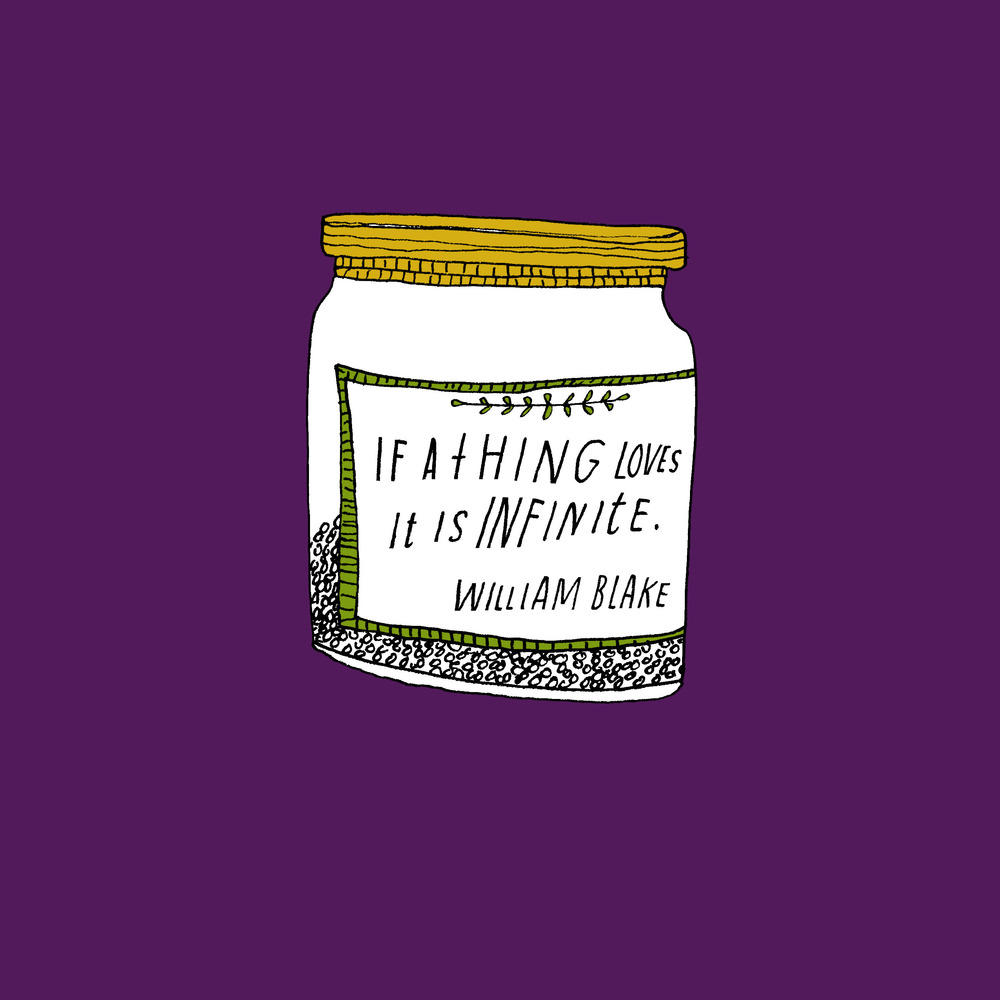
-
Albert Camus
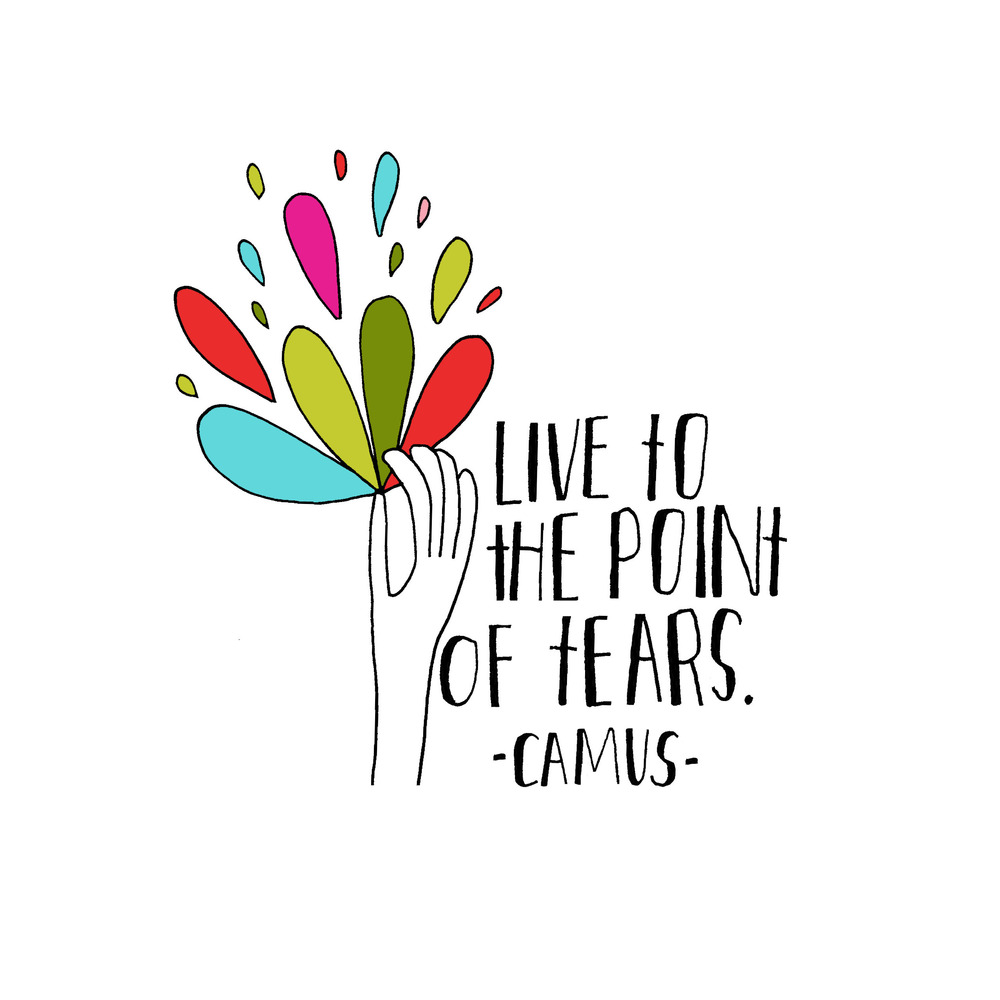
-
Emily Dickinson
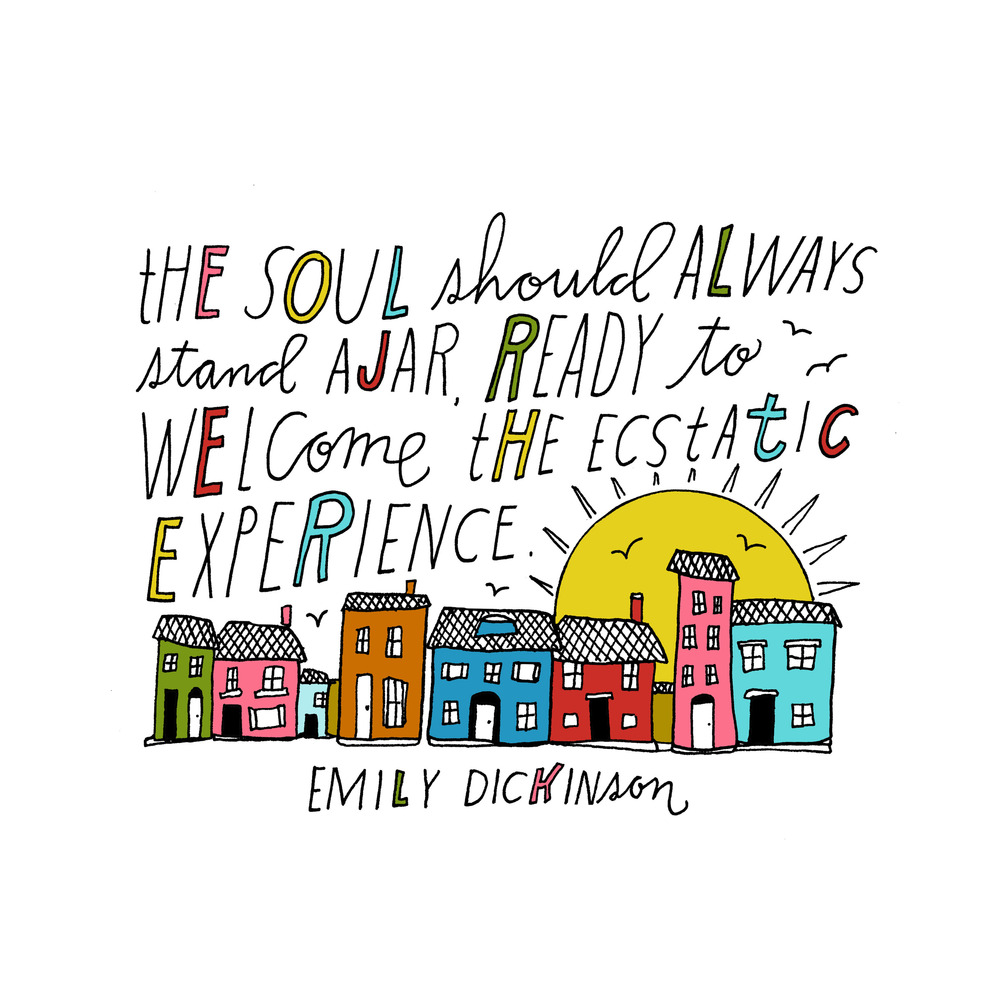
-
Gustave Flaubert
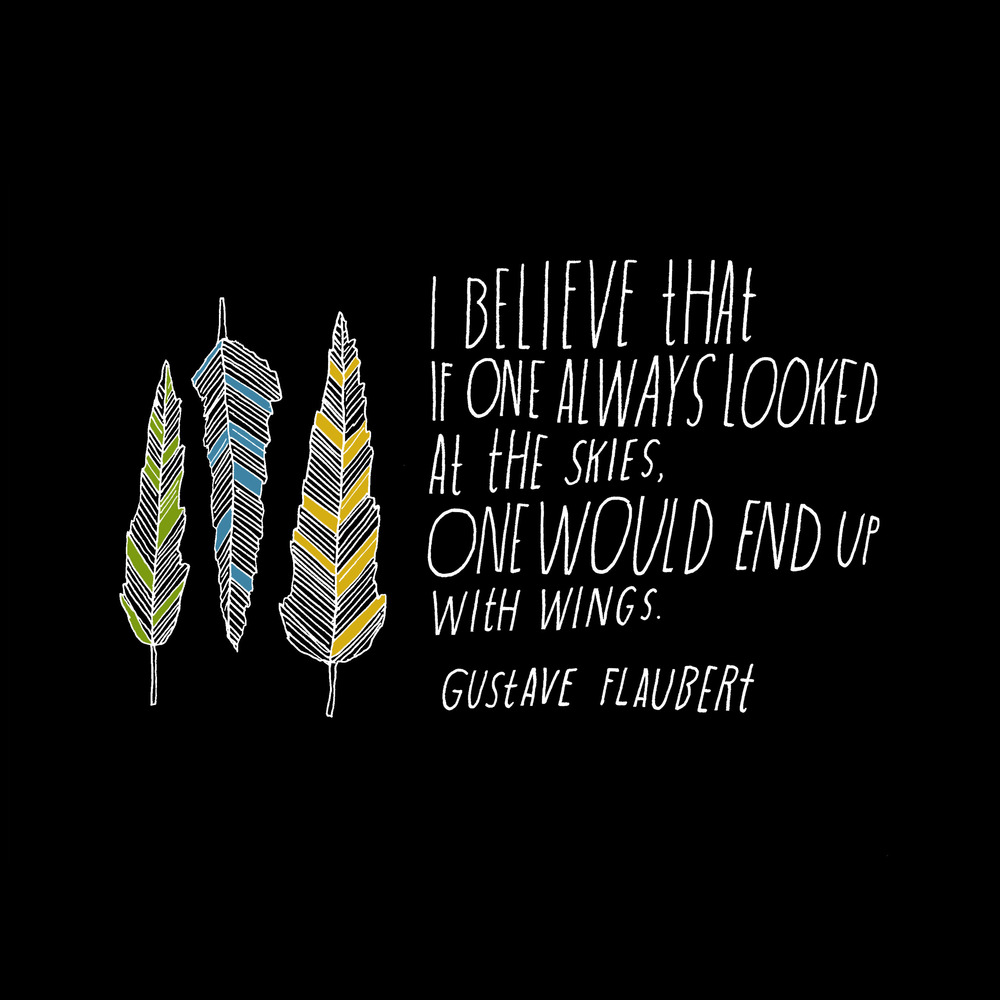
-
Nathaniel Hawthorne
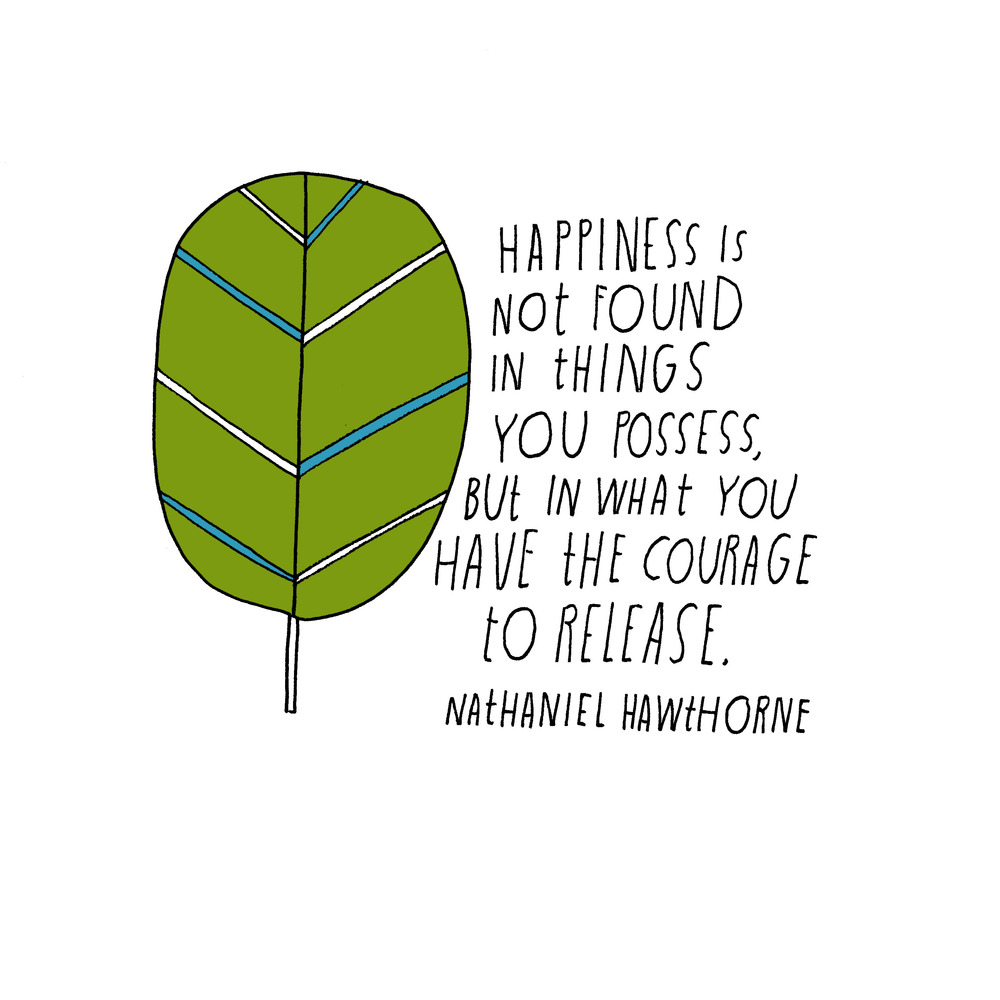
-
Jack Kerouac
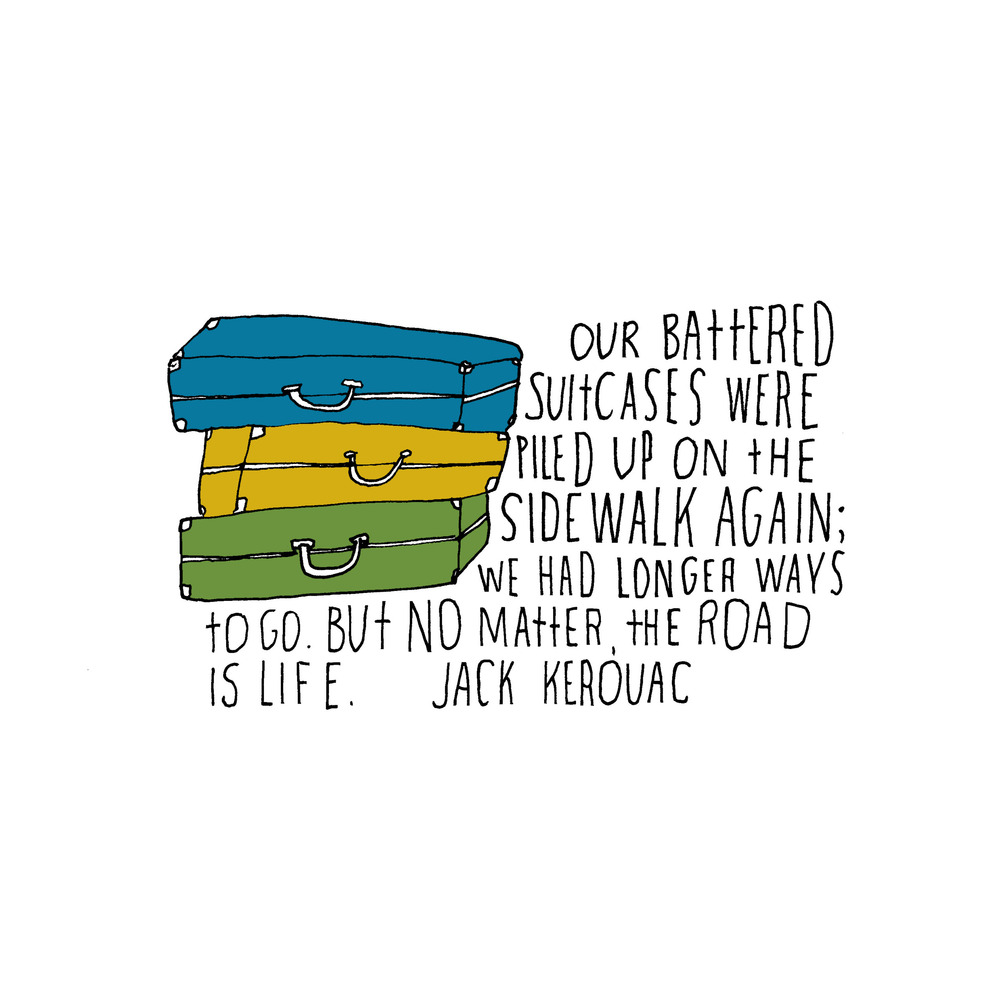
-
Harriet Beecher Stowe
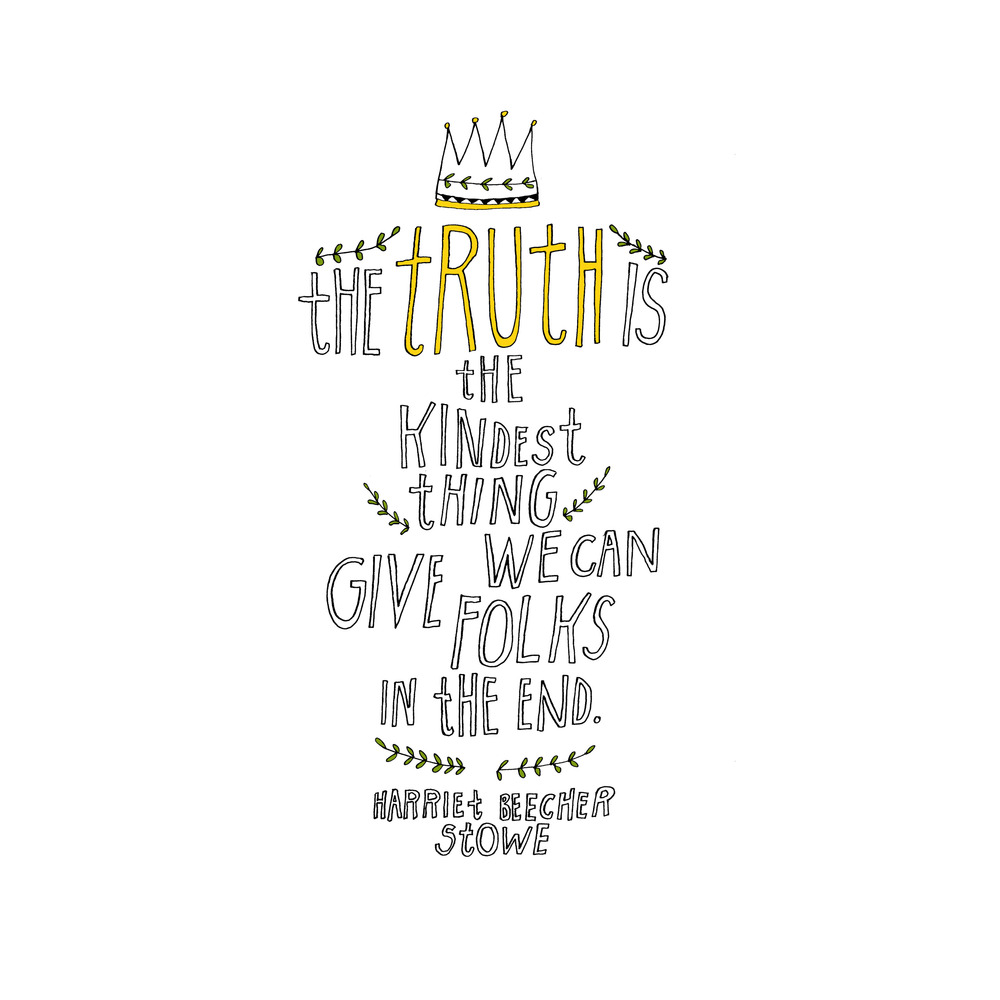
-
Voltaire
Written in Red (2nd of The Others series)
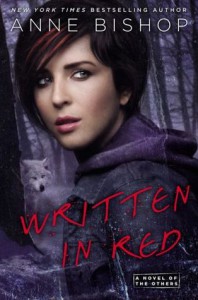
I got a bit sick of Bishop's Blood Jewels series after the main drama played out-- the other queens/characters didn't resonate as deeply with me, but this Others series, set in an AU Earth where there are shapeshifting Others with long lives & various "magical" powers who merely suffer the humans to live on most parts of the Earth (without a master/slave dynamic, per se) is fascinating. I suppose the best analogy would be to say that there's a kind of Native American mindset, but that's not really wholly accurate, except inasmuch as the Others value the land and its resources far more than humans.
Part of the enjoyment comes from the main character, Meg Corbyn, a human who nonetheless has powers of her own that she comes to learn to deal with over the two books so far-- she is likeable and while innocent, not twee or too much the damsel in distress. You root for her to become her own person.
I also enjoy that the Others really are that-- not human, without human priorities, and here, they are occasionally "monstrous," in that there is gore and violence and killing-- and their motivations are non-human. Bishop lets the monsters be monsters, because as the series develops, you can see the humans are not without flaws, and the humans are just as capable of being horrid as the Others, red in tooth and claw as they are.
The Others are merely natural-- the humans are the ones who are vicious and have to be kept in control.
It's an interesting morality play-- especially in light of global warming and population issues in other parts of the world, but Bishop manages to toe the line of not whacking you over the head with it, and keeps the plot and the relationships between all the characters moving along.
The secondary humans are all really well-written, even when their motivations are suspect, and the various races of Others we meet are fascinating for the plays off "traditional" myths about the shapeshifters versus how Bishop chooses to portray those groups.
The action's nonstop, but there's room for character development and some headscratching at yet-to-be-filled-in backstory-- overall, the narrative's tight, and the world building is different and welcome. I will be eagerly awaiting the third in the series and hoping it won't be the last.
Downloaded from B & N e-book shop, for Nook HD+.
Ottolenghi (the cookbook)

I have yet to cook anything except excellent food from any of Yotam Ottolenghi's cookbooks. I have Ottolenghi, Plenty & Jerusalem-- and every dish I've tried in every cookbook has been a keeper, even when the dish is more intricate in terms of the ingredient list or the number of steps. The flavors are always fresh, amazing, palate-wakening.
Downloaded from Google Play shop in ebook format for Nook HD+.
A Natural History of Dragons
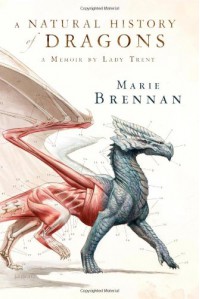
I wanted to give this more stars than I did, because Spunky Lady Heroine, Acquiring an Education! And Engaging in the Academic Study of Dragons! Plus, it's written in the style of a tongue-in-cheek memoir, in the style of Gail Carriger (though with less outright crack) by a flawed woman central character who's not too proud to admit her foibles. It sounds like a book I ought to have loved.
I wanted to. And there were some very good parts and characters. It didn't cohere, though.
In the end, the book was too much about the Love Story and the Journey, and there just were NOT ENOUGH DRAGONS. And there was too much flaw in the flawed woman, so that I just wanted to slap her by the end of the book and had no patience for her by the time we, the readers, were supposed to be mustering some.
Without giving the ending away in specifics (General Spoilers Ahead), the book really read more like a mystery whodunit that happened to have dragons on the very far sidelines plus Formative Tragedy To Be Continued In The Next Book. I was really disappointed by the whole ending-- it felt very rushed, very much like an emotional cheat, plus-- did I mention there weren't enough dragons? I probably won't read the sequel unless it's on SUUUUUPER sale, or available at the library-- I felt pretty cheated by the first book's ending and am worried that the second book will be similar in emotional & narrative tone.
Shadow and Bone (first in series)

This is a YA Fantasy novel-- I'd say dark fantasy, too-- about an ugly duckling misunderstood young woman gets powers in a traumatic way story that is very different from the usual fantasy for its AU Imperial Russia setting, that and the way the author approaches the magical powers our heroine learns to contend with. Bardugo doesn't spend a lot of time detailing the magical system, and there's always the feeling of something dark lurking, so that when things do start to turn in the story, it's not that you're not surprised, it's just that the foreboding has really loomed higher & higher over the course of the story so that when the monsters do show their true faces, it's even more dreadful & scary than most teen fantasy bothers to be.
There's a love triangle, which I could wish there wasn't, but it's a genre convention & it's handled much better than in most stories. The emotions here feel very raw & very real, even in the fantastical alternate setting of the story. This was one of the first books I'd read in a while I literally could not put down, and stayed up until 3 am just to finish.
First in a series.
Read in B & N e-book format on Nook HD+.
Tell the Wolves I'm Home

It would be tragic to call this just a coming-of-age novel or to call it a novel about the ways families fall apart and come back together again-- or at least try. I'd call it a book about imagination and choices, learning to live with being embarrassed, accepting that you are weird, and embracing defiance even when it hurts you and others around you because it's the only right choice.
That it also happens to be about sisterhood and family and secrets, trying to figure out who we are and accept that, and that it isn't pat, sentimental, or easily resolved with happy endings is all to the better. It has the feel of a magical realism novel, while being very much real.
B & N e-book, read on Nook HD+
Monstrous monsters, humans as well

I downloaded The Coldest Girl in Coldtown from the Google Play shop on kind of a whim, and polished it off in a day in a half on my Nook-- I had just finished another urban fantasy book and wanted something vampire-ish but not totally trash. Since this was Hugo-Nominated, I gave it a try.
This book is Dark-- it's a vampire dystopia, where the disease of vampirism is rampant, and the Infected must be confined in Coldtown-- to turn to vampires, to die, or sweat out the disease, but in any event, to never return to human life outside any Coldtown's walls.
I loved the book in the way that painful, truthful, uncomfortable stories about damaged people reacting to painful things can be loved. Suffice it to say I winced a lot and occasionally was a little nauseous on the characters' behalves; I wanted to kick our heroine's ex-boyfriend and fellow adventurer Aidan in the head a few times for being such a jackass a few times, and generally wanted to set the world on fire for Gavriel, our hero/villian/vampire/monster in chief, not to mention our heroine, Tana, who prior to the events of a vampire attack at a party she'd been at with Aidan, had already not been having the best of all possible lives, though she'd done what she could to put a shine on it for her little sister. Fuzzy end of the lollipop doesn't begin to describe it.
This is an adult book (as I see it, given all of the killings & gore, despite the lack of sex and the author's history writing YA) written with teenage characters and adult characters, all of whom are wonderfully flawed and not fully conscious of the reasons for all their actions. You could take a meta view and say "so and so reacted because of PTSD" or "this character wasn't really a monster, he was just misunderstood" and look at the book as an analysis of youth and aging, of arrested development despite the passage of time-- or you could look at it as an action/adventure roadtrip story, that happens to have teenagers & ancient vampires and some seriously deluded bloggers and other dumb kids who veer into the story at one point or another.
There are lots of layers to be peeled away-- I pretty much couldn't put it down, because the story was awful, in the old-fashioned sense of the word, moments of the grotesque interspersed with beautiful prose, reflections on what it meant to be human (or not) and what it means to be able to choose, for better or ill, and how that shapes us. The only "bad" part about the story, such as it is, is how the author chose to deal with Tana's reactions to Aiden, but I could understand her choices and I think my criticisms are more feminist quibbles than what was wrong for the character or any character in those particular shoes.
The world of the book feels very real-- very gritty & seedy & cold, like dirty ice on your skin. It's a book to reread, and make you ponder-- aren't we all entitled to love, even the monsters?
Short, action-packed urban fantasy with a twist

I've read Ilona Andrews' Edge Series & her Kate Daniels series-- both are good, but I've set them aside as getting a bit formulaic and me needing a break.
Clean Sweep was something new from this husband/wife writing duo. Apparently it was a serial online, and has since been published-- it's a novella, 164 pages, and it sweeps you along accordingly.
There's more humor than in some of Andrews' prior writing, both in the heroine's own sense of humor and less of a sense of self-pity for her (genre convention) sad backstory, as well as in the setting & side characters who populate this novella. What I enjoyed, though, was that I expected Urban Fantasy and ended up with a strong dose of Sci-Fi and Clarke's Third Law/Speculation done quickly & well, with enough details to let you feel like there was world building and ooh, cool, aliens, without bogging the novella down in too much detail.
This is in many ways a conventional genre read/first in series book, although unlike Daniels' Edge & Daniels series, the romance is more under the surface & G-rated, which I happened to like. The focus was more on the action and the characters' particular personal challenges that had to be solved, not True Love ALSO winning the day. So... you have: Spunky heroine with a tragic backstory coming into her powers is faced with a challenge & must figure out how to negotiate it while coming into contact & conflict with attractive ego-driven supernatural/alien males (who need to be taken down a peg over the run of the book) and not running afoul of the various powers that be as well as her own principles. Add in some really neat worldbuilding details, a really enjoyable set of amoral/clueless side characters who I hope become series regulars, and some truly interesting moments of self-reflection, morality, ruminations on what it means to be a neutral, not to mention consideration of humans' insignificant place in the universe in & among some of the fourth-wall busting of the werewolf/"witch"/vampire love triangle that (SPOILER) I am glad doesn't take off, because there's so much going on in the heroine's life that I would have felt disappointed if that was how the book had ended.
But end it did, and with a good vibe for the heroine (my recent problem with books has been that Love Solves Everything and here, it was the much more satisfactory & feminist Kicking Butt and Asking for Help and Demanding Answers Gets You Someplace, even if you're still single) & lots of possibility for the future.
I am relieved, however, to find that Ch. 1 of the next book is already up on the authors' website.
Patching together a life-- Book of Ages by Jill Lepore
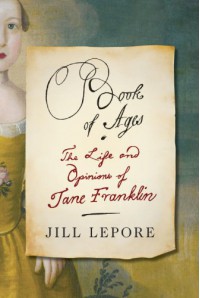
Writing a history, much less a biography, from admittedly scant secondary sources has got to be hard. And trying to follow the vogue of making the narrative flow in as fiction-like a manner at the time has got to be doubly difficult.
It took me a bit to get into Jill Lepore's biography of Jane Franklin as a result-- I felt like she was stretching too hard to put together not just Jane's story, what little there was, but to use it to highlight what can be called the "Room of One's Own" problem (one she specifically touches on at the end of the book, and one that's a bit heavy-handedly foreshadowed throughout), in that the lives of the "obscure" (read: women) as defined by male historians are often elided or sometimes actively destroyed in the attempt to exalt their male relations.
I came away from the book feeling like Benjamin Franklin was bright and complicated, and more than a bit of an ass, and that I have no need to read anything more about him, because he was featured so much in this book-- and that Jill Lepore, in attempting to give Jane some context, did a little too much context, and so Jane a bit got lost in the whole run up to her story of all the predecessor emigrant & lady ancestor Franklins (etc.)-- it was more than a third of the book before her story really got started. (I started to feel like I was reading the first few books after Exodus-- too many begats, in the end.)
Jane's letters & her back and forth with her brother and the rest of her relations (I wish there had been more of those letters, but Lepore doesn't say if those letters don't exist or if she doesn't include them because her focus is on the "Judith Shakespeare" problem and how her brightness and own set of opinions on politics, faith, and her family's (and not just her brother's) trials and success fade against Benjamin's-- so that the focus is on the interplay in their letters, and any references thereto in their correspondence to others.
She emerges, as Lepore paints her, as benighted but not pitiful, hard-working and good-humored and blessed of quick temper and wit, in all the permutations that latter word can obtain. And the tragedy of her lack of education is hammered home-- again, heavy-handed at times-- but nevertheless, her example and the insight her letters shine on everyday life in revolutionary times in New England for everyone who was decidedly NOT a founding father were interesting to read, and kept me going even when the whole "but Benjamin, who had every advantage" contrast had me rolling my eyes a bit.
Overall, it's a good portrait of a person we wouldn't otherwise know much about, and I appreciate the effort, intentioned or not, to paint (contrast?) Benjamin Franklin as anything other than the unqualified Renaissance hero & glorious rake that people like to paint him as. Jane Franklin comes off (from the little Lepore is able to glean, and I don't think she puffs even as she expands and surmises, with reason) as a woman who, with better opportunity, would have been every bit the firebrand of Abigail Adams (whose biographies and letters I haven't read yet, and now, maybe I will) was-- if firebrand is the right term-- and it's a worthwhile read even if parts of it are a but of a slog, for the background pictures of colonial Boston and non-founding father colonial everyday life.
Little House on the Prairie, it's not, but it's hardly the gilded portraits hanging in the National Gallery, either, and I think the reader's all the better for it.
2013 Reading Roundup
For all that I worked in a bookstore between 2009 and 2012, my reading fell off dramatically for a while. I tried to get back on track in 2013-- I wouldn’t say my attention span’s entirely recovered, for reasons of: general life stuff, intermittent depression, exciting & super-hectic new job, internet attention span disorder, etc., but I do feel like I put a more concerted effort into reading more, even if I didn’t finish everything, and/or am still working on things I started. Still, in the interest of accountability (and not so much because I think anyone cares) here are the things I read, or tried to, in 2013: 
Things I Started Before the End of the Year and So Am Still Reading:
Book of Ages, The Life and Opinions of Jane Franklin, Jill Lepore (history/letters)-- Ben Franklin was kind of a dick, Jane Franklin had it rough, Jill Lepore is reaching a bit for straws, and colonial history is actually fascinating as hell.
Things I Started to Read and Am Not Going to Finish:
Angelology, Danielle Trussoni-- escapist angel sci/fi-fantasy. Fun, but I wasn’t feeling it and it got kind of Dan Brown and draggy. Not bad, just not my thing.
The Wind-Up Bird Chronicles, Haruki Murakami-- I just had no sympathy for any of the characters, even if I thought the premise of the novel interesting. So, no.
The Great Gatsby, F. Scott Fitzgerald-- too purplely, and I just don’t care about anyone in the story, at all.
Roll Me Up and Smoke Me When I Die, Willie Nelson-- I love Willie, but he needed an editor and about a pound less weed to make this coherent.
Lady of the Forest, Jennifer Roberson (Fantasy)-- Robin Hood, from Maid Marian’s perspective. It started out way too imminent-threat-of-rape and with way too much romance-with-Robin and back-and-forth with the chronology flashbacks-- just, ugh.
Ruhlman’s Twenty, Michael Ruhlman-- I’m glad it was a free download. I’m sure the recipes are good but his writing is like nails on chalkboard to me, I don’t know why.
Best Served Cold, Joe Abercrombie (Fantasy)-- Lady warrior, done wrong, goes out for revenge. Way too dark, and I just didn’t like the writing.
Bread Alone, Judith R. Hendricks (Fiction)-- I had hoped this was going to be a lady-friendship novel, but instead it was another disappointing lady friends fight over romance novel. I would have thrown it across the room except that it would have broken my Nook.
How to Be a Woman, Caitlin Moran-- Moran's billed as a British Tina Fey, and I was sort of enjoying the book but also finding her to be a little too "Aren't my insecurities Quirky and Endearing," and then she got caught out making the whole Sherlock panel squirm by making fun of fandom and fanfiction writers, so now I just think she's a judgmental crank who is too insecure to live and let live, and I have no interest in reading her books. Note to Caitlin Moran: Neil Gaiman started out writing fanfiction. Are you going to make fun of him?
Series I Started and Won’t Finish--
Jennifer Estep’s Widow’s Web series (Urban Fantasy). I like the idea of flawed badass lady assassins with the found-family trope, but why, oh, why, does there always have to be a romance and an old family vendetta? Can’t it just be a procedural?
Sandman Slim series, Richard Kadrey (Urban Fantasy/Horror)-- Gritty as hell, and well-written, but the grimness just started to drag at my soul and all the black humor couldn’t uplift me anymore.
Iron Seas Series, Meljean Brook (Steampunk Fantasy/Romance)-- I read the Iron Duke and thought it was great, but this second book about a secondary character from the first book and a new character just hit every feminist squick that I had, and I couldn’t stand to keep reading to see whether the male character got his comeuppance.
Ready Player One, Ernest Cline-- I liked it, but I’m not a video gamer and it got kind of boggy in the middle. I haven’t decided if I’m getting back to it or not.
Things I Started to Read and Will Get Back To:
Swamplandia, Karen Russell (Fiction)-- Really good, but I got distracted by starting my new job and haven’t come back to it.
Harvest of the Cold Months, Elizabeth David (Food History)-- I downloaded this while we were in Italy so I could read the bit about the ice houses in the Boboli Gardens, but Elizabeth David is always great for a chapter before bed and this is one of her books I haven’t finished yet.
George Orwell, Diaries-- I had it by my bedside, and then it got replaced by something else. I’ll get back to it.
Bicycle Diaries, by David Byrne-- I think it’s probably something I’ll handle better in small doses.
Kraken, by China Mieville (Sci-Fi/Horror)-- I go up and down on his stuff-- it got weird and creepy so I skipped to the end, and now I don’t know if I want to finish it, but I’m not ready to give up on it yet.
Beyond the Beautiful Forevers, by Katherine Boo (Non-fiction)-- I was reading this when I started the new job and didn’t have the time to devote to it, plus it was kind of a bummer and I knew I needed to be in a better mental space for it.
The School of Essential Ingredients, Erica Baumeister (fiction)-- It got a little too reminiscent of things in my marriage, so I put it aside.
A Natural History of Dragons, Marie Brennan (Sci-Fi/Fantasy)-- Really good, but it’s something you can pick up and put down, so I am.
Complete Stories, Dorothy Parker (fiction): Sometimes you need rapier wit.
Etiquette & Espionage, Gail Carriger (YA Steampunk/Fantasy): Another series I started at the same time as my new job, and will get back to because I loved Carriger’s Parasol Protectorate Series so very much.
Blue Nights, Joan Didon (Memoir)-- I needed a break from the relentless sadness. But her writing is exquisite.
The Language of Flowers, Vanessa Diffenbaugh (Fiction)-- I was getting bummed out, skipped to the end, and haven’t gone back to finish it but will. It’s beautifully written, but hews a little too emotionally close in some places.
Cold Magic, Kate Elliott (YA, Fantasy)-- Very different worldbuilding, magic systems, protagonists, and seems promising, but my dad went into the hospital and I haven’t gotten back to it yet.
Conscious Capitalism, Jon Mackey & Ras Sisodia-- I bought it because the company’s founder wrote it, and I keep picking it up and putting it down while my inner college economist & political pragmatist says It doesn’t work that way! because of course the point is that maybe it could if we tried.
How Should a Person Be?, Sheila Heti (Fiction)-- I can’t decide if this is hipster bullshit or actually deep, and sometimes I want to throw it at the wall and sometimes I highlight whole paragraphs. I’m keeping at it, so far.
Never Let Me Go, Kazuo Ishiguro (Fiction?/Sci-Fi)-- Really well-written, chilling as hell, so I keep putting it down.
The Backyard Homestead, Carleen Madigan-- I started it as research for my NaNo novel (postapocalyptic world re-building), and then my dad went into the hospital, but it’s a good general gardening reference as well.
Search Party, Collected Poems, William Matthews-- Matthews is austere and beautiful but a little bit goes a long way. I dip in every once and a while.
Eleanor & Park, Rainbow Rowell (YA Fiction)-- Misunderstood teens, trying to understand and be less lonely. Perfection.
Divergent, Veronica Roth (YA Sci-Fi)-- Misunderstood teens, trying to not be understood and be less lonely. Kind of trope-filled and WHY DOES THERE ALWAYS HAVE TO BE STAR-STRUCK ROMANCE, but the evil villian is good and the world-building caste-thing, while not novel, is at least interesting enough that I’ll come back to it when I’m over my disgust at every YA girl heroine having to be such a girl. I need more misandry in my YA, IDK.
A Field Guide to Getting Lost, Rebecca Solnit (Nonfiction/Memoir)-- It’s hard to categorize what Solnit’s writing is-- she picks a theme, and then writes about her own experiences in and around musings on historical factoids-- here, geography, cartography, epistemology-- all the ways a person can lose & find themselves. It’s dense, but always amazing.
Quiet, Susan Cain-- Really well done, but I got distracted by the new job and didn't have the attention span for non-fiction.
Things I Re-Read:
The Hitchhiker’s Guide to the Galaxy, by Douglas Adams (Sci-Fi)-- I will never, ever, get the hang of Thursdays.
Arrows of the Queen series, Mercedes Lackey-- Chicken Soup for the inner angsty teen in us all.
Last Herald Mage series, Mercedes Lackey-- Cheetos for the even angstier teen in us all.
Living Low Carb, Fran McCullough
Things I Actually Finished:
Cookbooks:
I don’t know if “finished” is the right word for cookbooks-- some of these I read cover-to-cover, some of these I have cooked at least a half-dozen recipes from, which I consider significant use.
Jerusalem, Yotam Ottolenghi
Plenty, Yotam Ottolenghi
Ottolenghi, Yotam Ottolenghi (Are you detecting a theme here? Anything he does with
fish or salad is alright with me. He even makes me like mint, and I hate mint like other people hate cilantro. His hummus recipe. His muhadarra.)
The Smitten Kitchen Cookbook, by Deb Perelman-- I liked the eggplant recipe I made from the book, but I’ve ended up cooking out of it less than I’d hoped because too many of the recipes are too high in carbs and I can’t be bothered to de-carb them.
American Heart Association Low-Salt Cookbook-- does what it says on the tin. Not all that gourmet, but I needed a list of name-brand packaged goods at the recommended sodium intake for congestive heart failure, as well as a list of magnesium dense foods to work with, and this does that. It’s also more sensitive to the fact that many people on low-salt diets are also diabetic, and not too many of the recipes are that high in carbs. There are a few with couscous or orzo, but that’s easy to deal with by subbing quinoa or shredded zucchini or carrot.
Food in Jars, Marisa McClellan-- downloaded from some free e-book website for research for my NaNo-- the recipes are pretty impractical and too gourmet for putting things by.
Twenty-Dollar, Twenty-Minute Meals, Caroline Wright-- practical, tasty, and great for riffing off of.
Tender, Nigel Slater-- I bought Tender & Ripe when they came out, but then, they were such doorstops I barely cracked them. I used Tender for a half-dozen things at Thanksgiving and have kept going since.
A Girl and Her Pig, April Bloomfield-- I don’t cook much from it, but the book gives me ideas, and April Bloomfield’s terrific.
La Tartine Gourmande, Beatrice Peltre-- lovely recipes, amazing photography, but the recipes take more work and more alternative grains than I usually have time for. It’s more of an aspirational book than anything else. I need to try a few of the desserts before I get rid of it, because most gluten-free cookbooks are full of xanthan gum and sugar and Peltre at least is low sugar.
The Food 52 Cookbook-- I made one soup, and it was good, but I have too many cookbooks. I more or less bought it to support Amanda Hesser, but then the site really took off and I decided she was doing ok without me.
Vegetable Literacy, Deborah Madison-- Deborah Madison is one of those writers I like a lot in theory and then I don’t use much in practice. It’s a beautiful book, though, and you learn some botany just flipping through.
The Complete Book of Vegan Substitutions, Quayside-- The red lentil gingerbread is actually quite good. I’ve used it a few times, but it’s more of an in-case reference than anything else. I’m not vegan, but I keep it in case I need to cook for someone who is.
Poetry:
Aimless Love, by Billy Collins-- collects many of Collins’ poems to date, plus new ones. I am always glad to have Collins to carry around, since he carries off humor and heartbreak and deep meaning all in the space of a number of pages, and often in the same poem. The collection contains one of my favorites of his, pretty much ever-- Hippos on Holiday.
Wine for a Shotgun, Marty McConnell-- Profane, fearless, loving, raw.
Most of the issues of my subscription to Poetry magazine, plus their tablet app
Get Lucky, Nicole Steinberg-- an indie press publication by a friend of mine through Spooky Girl Press, this is a clever, sweet, snarky, achy, subversive look at being a woman and being alive.
Seasonal Works with Letters on Fire, Brenda Hillman-- another National Book Award finalist. I think it’s a little too strident for me.
A Thousand Mornings, Mary Oliver-- It’s Mary Oliver. Every poem is a natural prayer and a rejoicing.
Living for a Living, Buddy Wakefield-- Joyous, racous, grief-filled, surreal, amazing.
Stay, Illusion, Lucie Brock-Broido-- Weird, captivating, lovely. I can see why it was a National Book Award finalist.
Goblin Market & Other Poems, Christina Rosetti-- a classic. Romantic. Kind of weird, but in a good way.
Richard Siken, Crush-- I am unapologetic about the fact that I was turned on to this book by fandom. Richard Siken’s poems are raw & amazing, gay, crushing & lovely, cruel & kind.
W.S. Merwin, Collected Poems-- I think I like his later things better than his earlier.
Our Andromeda, Brenda Shaughnessy-- At times triumphant, at times achingly sad.
Sci-Fi/Horror/Fantasy:
Sharp Teeth, Toby Barlow-- not your typical horror werewolf novel love story in verse. Yeah. It’s really different, really well-done, and the ending is completely unexpected.
Ancillary Justice, Ann Leckie-- Military Sci-Fi. The world-building and the things she does with chronology and ruminations on sentience and what makes someone human, much less humane, will astound you. Long, and worth it.
Blackbirds, Chuck Wendig (Urban Fantasy)-- An interesting take on the road-trip trope as well as the harbinger-of-death trying to escape her fate trope.
Pacific Rim, the novelization, Alex Irvine: If you don’t like giant robots piloted by awesome people who learn share their feelings and then go smash evil aliens and save the world, we need to talk.
Romance:
A Civil Contract, Georgette Heyer: The ugly duckling saves the handsome prince and then they fall in love story. No smut, because Heyer wrote in the 20s and 30s, and the writing is really well done. It’s more of an adult romance than others I’ve read, and the misunderstandings between the main characters feel real, even if the writing is a little old fashioned and at times just a bit overwrought.
Graphic Novels:
Hellboy, Vols. 1-3, Mike Mignola-- Hellboy is awesome. Shut up.
Saga, Vols. 1 & 2-- Brian Vaughan-- Sci-fi epic grapic space opera that is definitely NOT for kids. The art is fantastic, the writing’s amazing, and I just wish more of the series were available in e-book.
Hawkeye, Matt Fraction-- I go up and down on reading Avengers comics, since I’m pretty much an Iron Man and Thor groupie only (not that I don't love Black Widow, I just find the comics too erratically written and get frustrated), but the writing and art is awesome and different, even if I’m not a huge fan of the whole Young Avengers thing.
Sandman, #1-3, Neil Gaiman-- Dark, complex, fantastic. I’m rationing myself one for every three other books I finish.
Ex Machina, Vol. 1 & 2, Brian Vaughan-- Sci-fi. There’s only one superhero in the whole world, he exists by random chance, and he stopped one of the two Twin Towers from falling-- and now he’s Mayor of New York. A guy’s going to feel some guilt about that, and a hell of a lot of responsibility, too. Dark, adult, and not just a sock-em-up comic.
Fables, Vols. 1-5, Brian Willingham-- Fairy tales are real, and their denizens have their own stories to tell. Amazing art, amazing dark stories, amazing reimagination of stories that weren’t ever for children in the first place.
The Walking Dead, Vol. 1, Robert Kirkman-- Well, now I see what all the fuss is about. I'm probably doomed.
YA:
Seraphina, Rachel Hartman (Fantasy)-- One of the best books, dragon or not, that I’ve read in a long time. I devoured it in one sitting.
Stormdancer, Jay Kristoff (Steampunk Fantasy)-- Steampunk Shogunate Japan, with airships, flying tiger-dragons, and found family tropes with a fierce heroine at the heart. What’s not to love?
Beauty Queens, Libba Bray (Fiction)-- Lord of the Flies meets Girl Power. Hysterical and an amazing critique of rightist religion and consumer culture. Libba Bray is awesome.
Graceling, Kristin Cashore (Fantasy)-- another Girl Power fantasy YA that started off great and then veered into Romance. Overall, well-done, and the background idea of the graces as curses of sorts and the world-building is great, but I guess I am not in a place for love stories, and I also kind of just thought it detracted from the main story. The series isn’t continuous, in the vein of some of Madeleine L’Engle’s books-- characters pop in and out, but aren’t main characters in later books, and I’m told the rest of the books are great.
Fiction:
Gone Girl, Gillian Flynn-- Exquisitely written, completely repellent.
The Dog Stars, Peter Heller-- Beautiful, hopeful, sad post-apocalyptic near poetry, with ruminations on poetry, pets, hiking, humanity and guns-- sometimes in that order, sometimes not so very much.
Mr. Penumbra’s 24-Hour Bookstore, Robin Sloan-- On books, the internet, secret societies, and the need for connection. More or less.
The Patrick Melrose Novels, including At Last (1-5), Edward St. Aubyn-- St. Aubyn writes about horrible people doing unspeakable things and about sympathetic people making horrid mistakes, and then taking a while to get over the things that they've done to themselves and had done to them. The books are gutting and blackly funny and some of the best writing you will read, ever.
The Interestings, Meg Wolitzer-- What all the reviews say, plus, way less self-involved than any of those jackass Brooklyn Jonathans.
The Age of Miracles, Karen Thompson Walher-- Does what it says on the tin.
Shine, Shine, Shine, Lydia Netzer-- I thought I’d hate it. I really, really didn’t.
City of Dark Magic, Magnus Flyte-- It’s a little too impressed with itself, and like Matrix 2 & 3, there are a few too many plotlines, but it’s music & Beethoven & time travel (of sorts) and intrigue and Prague, and unlike Deborah Harkness’ series, which I’m not going to finish, it’s not undying love with goddamned vampires
Self-Help:
The Gifts of Imperfection, Brene Brown-- I’m ¾ of the way through, and I’ve got a notebook full of notes, I count that as done. It’s a great book, all about working on not being so hard on yourself and letting go of the need to fix everything.
Help, Thanks, Wow, Anne Lamott-- Whether or not you believe in a God, learning to pause and ask for help, to be grateful, and to relearn to wonder again are all lessons Lamott is great at teaching with humor and brevity.
Memoir:
Hyperbole and a Half, Allie Brosh-- If you’ve been living under an internet rock all this time, just read it, okay?
Marbles, Ellen Forney-- this could be classified as a graphic novel but it’s more of a memoir about manic depression. I don’t know if I liked it, or the author, but it’s an accurate, if different, account of manic-depression than the one I’ve been through.
Is Everyone Hanging Out Without Me?, Mindy Kaling-- Eh. I like the idea of Mindy Kaling, but I didn’t find The Office funny and never watched it, and I kind of finished the book out of a sense of feminist obligation, rather than any real enjoyment. Not awful, but maybe I’m just not in the right humor demographic any more.
Making Toast, Roger Rosenblatt-- As lovely & sad as everyone says.
Non-Fiction:
Lonely Planet Florence & Tuscany-- the ebook malfunctions on the Nook, note to anyone who might download it.-- good for practical travel tips.
Knopf Florence MapGuide-- super useful from a pocket map & little places to eat perspective, and also for little artisan shops.
Michelin Green Guide to Tuscany-- good for all the out-of-Florence travel.
Let’s Go Florence-- useless, no information about transportation to speak of, and very little information about historical sites. All the focus is on cheap eats and cheap hostels, which I guess is my fault for not remembering.
DK Florence & Tuscany-- perfect for supplementing the imperfect English in some of the smaller Italian museums.
The Food Lover’s Guide to Florence, Emily Miller-- Really well written, though we didn’t use it as much as I’d hoped because my Dad was too tired at the end of the night to travel around for culinary adventures.
How to Be Black, Baratunde Thurston (Satire? Memoir? Scathing History of American Racism?)-- Thurston is an excellent writer. You’ll laugh and squirm, and reexamine your interactions and perspectives. Which is what all good writing should do.
Wild werewolves (in verse)

I'm not much of an urban fantasy reader, even if I will admit to being addicted to trashy supernatural TV shows of that ilk. Still, having avoided Twilight, Laurel K. Hamilton, and most of that genre, I do enjoy novels in verse and if someone promises me that the book is bloody, complex, and full of antiheroes, then I am all in, werewolves or not.
To say too much would spoil it, except to say that Sharp Teeth is unexpected, elides genre conventions, is full of culture-critical senseless violence that makes all too much sense in context, and ends nowhere near how one might expect.
Just as any real reader could hope.
(Downloaded from B & N onto my Nook HD+ and read in ebook format)
Poetic post-apocalyptic novel, hints of grim with bright hints of dawn-- Peter Heller's "The Dog Stars"

One of the good things about transatlantic flights is they give you the time to actually sit down and finish a book. I'd downloaded this one a while ago on the strength of its reviews (and its comparisons to Cormac McCarthy's The Road, both in linguistic style, length, and overall tone) but for various reasons having nothing to do with the book and more to do with my attention span, it took a trip abroad to make me sit down and read it.
I loved it. Dog Stars is both the same and very different, poetically hopeful versus moments of beauty as we all march on to our death-- it's radically different, that way, than The Road-- there is still that broken-up, post-apocalypse syntax (and there's a reason for that made clear not too long into the narrator's explanation for what's happened to him), that sense of all gone totally strange, and there is still that solo narrator whose primary perspective carries us through the whole thing.
Like The Road, there's the issue of punctuation (or not) and the question of linear narrative and punctuation that traditional linear narrative snobs might get up in arms about, but those things aren't particular to only The Road, and I don't see them as bars, though to some people they're deal-breakers, and this is very much a post-modern novel in lots of ways.
But there are also moments of stunning beauty, meditations on who we have been and become, deep raw emotion and gasping inhumanity, and finally, because this is the essence of the book, in and among the mundanities of survivalism that are scattered about: beautiful, poetic meditations of grief and what it means to not just subsist but try to find a reason to hope, to not be lonely, even when you're alone, to not let memory drown you-- and unlike The Road, the overall picture (SPOILERS for both books) isn't quite so grim, though there are horrifying and tear-inducing moments throughout.
There aren't any zombies. Just the ravages of man's inhumanity to man, and being too clever for himself on the end, and having to re-learn the old ways (or die). There's violence, and farming, and fishing, and flying, and learning new ways to think about time, and memory, and being (in some ways it also reminded me of Tinkers)-- and the book put me in a deeply philosophical frame of mind (and left me not so deeply & poetically gutted as McCarthy, either) once I was done. It made me think that maybe, if I just had enough Storey's Country Wisdom manuals, then there would be lots of horrible things I would hate to have to learn doing, but there might be things I could learn, and maybe there might be hope that there would be others who might not shoot first, learn later.
The Amazon-only e-book problem
I have a Nook e-reader, and when it goes kaput, I'll switch to some kind of Android or Windows tablet-- maybe even Kobo, who knows.
I won't buy a Kindle, because I've worked in bookstores and know how Amazon's price gouging (it's not "competitive pricing," it's a monopolistic clubbing to death of competitors, until there's nobody left) has affected both indies and other big-box retailers. I won't buy an iPad, because I don't think Apple products are as state as the art as they think they are and if I'm primarily using the device for reading and maybe the occasional email or web-browse, why the heck do I need a camera?
What I don't understand is why so many e-publishers and authors are going Amazon-only. Is it a condition of e-publishing with Amazon? Do e-publishers not know about Barnes & Nobles' pub-it extension to let you self-publish to .epub format? Do e-publishers not know about Calibre and its brethren? Do e-publishers simply not care about readers who aren't mass, lowest-price-only consumers, or readers of e-formats who would prefer to use something that isn't just the path of least resistance?
I generalize, wildly, even, but I am curious, too. I haven't read the terms of any of the Amazon self-publishing contracts. I know that some of the third-party "self-publishers" like CreateSpace, et. als., used to require you to use their format for a certain blackout period, but I wonder if authors think it's worth it versus the share of readers who don't own Kindles and/or use the Kindle app on their overpriced iProduct but who might, otherwise, buy their book.
I've been attracted more than once in the last couple of months to information about books that I'd love to download-- only to find out they're Kindle-only. And inquiries to the author go unanswered. It's too bad, because a DRM-free, multiplatform publication would seem to be the answer to reaching the maximum audience... I find it hard to believe that authors-- who write all day on a computer-- can't figure out how to use more than one electronic publishing format.
Anyone have any experience with the pros and cons of why authors would turn away potential buyers, just because they don't own Kindles?
Can't stop with just one...
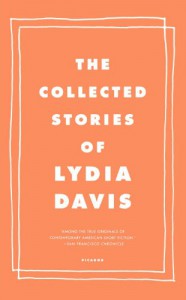
I haven't finished this book-- it lives next to my bed, migrates throughout the house. Davis is the master of the microstory, of the changing narrative style, of the one-sentence punch to the chest.
Every time I think I know her voice, it changes.
Every time I think what POV she's going to come front, she changes it up.
I probably will never finish this book-- because if I ever make it through all of these stories, re-reading them will teach me something utterly new.
Handy e-cookbook to have when you're shopping and have no idea what to cook

I read Food52 infrequently, though I have always had luck with their recipes-- but I read Caroline Wright's columns on quick meals religiously, and was thrilled when they were compiled as a book.
This is bright, quick, easy cooking with an emphasis on fresh vegetables, fruits, and not-to-fussy protein preparations. There are some vegetarian options, but it's not a vegan/vegetarian cookbook if that's what you're mostly in the market to buy.
The recipes all have photographs, are easy to follow, and come together as directed. I haven't followed them all to a T-- sometimes I use them more as flavor-combo inspiration than anything else, but unlike other cookbooks I have on my e-reader that are there for pleasure reading more than reference, this is one that actually sits in my cart as I shop.
(Downloaded from Google Play shop, read on a Nook HD+)

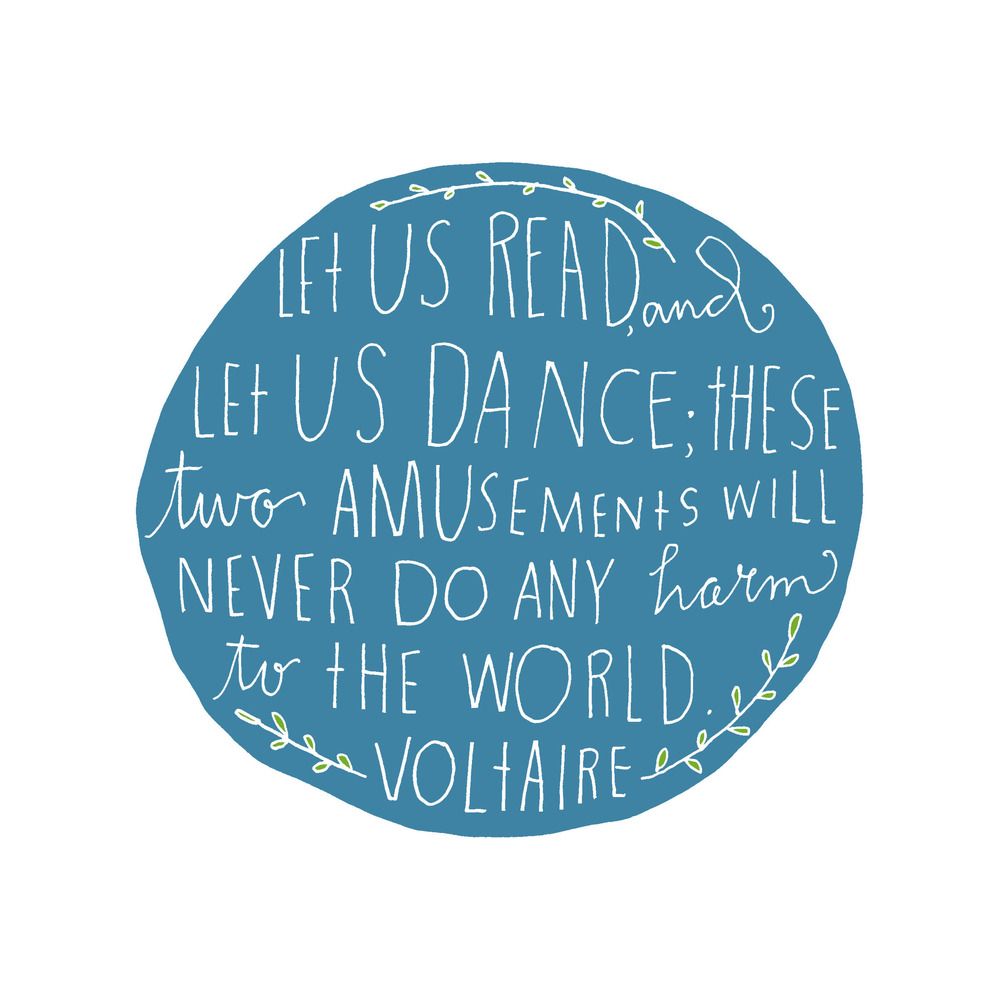


 1
1
 1
1



